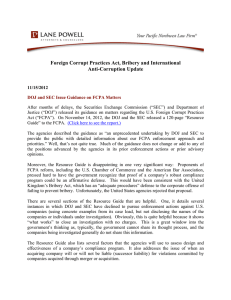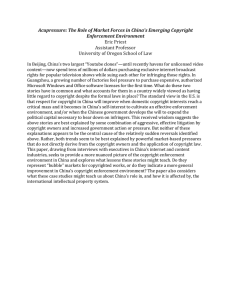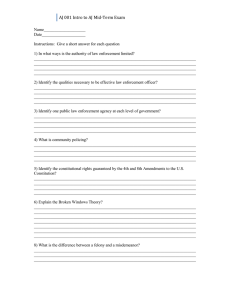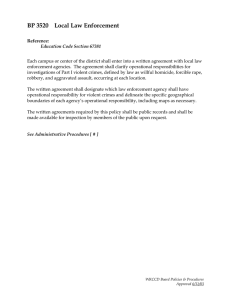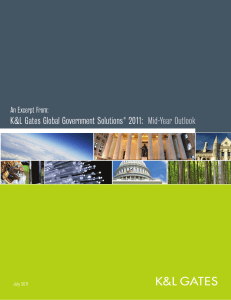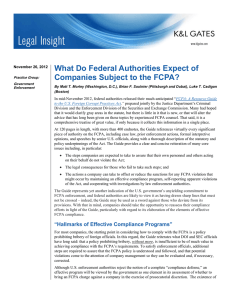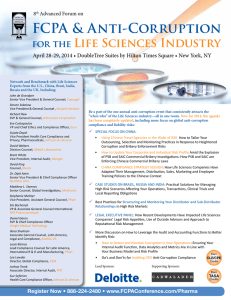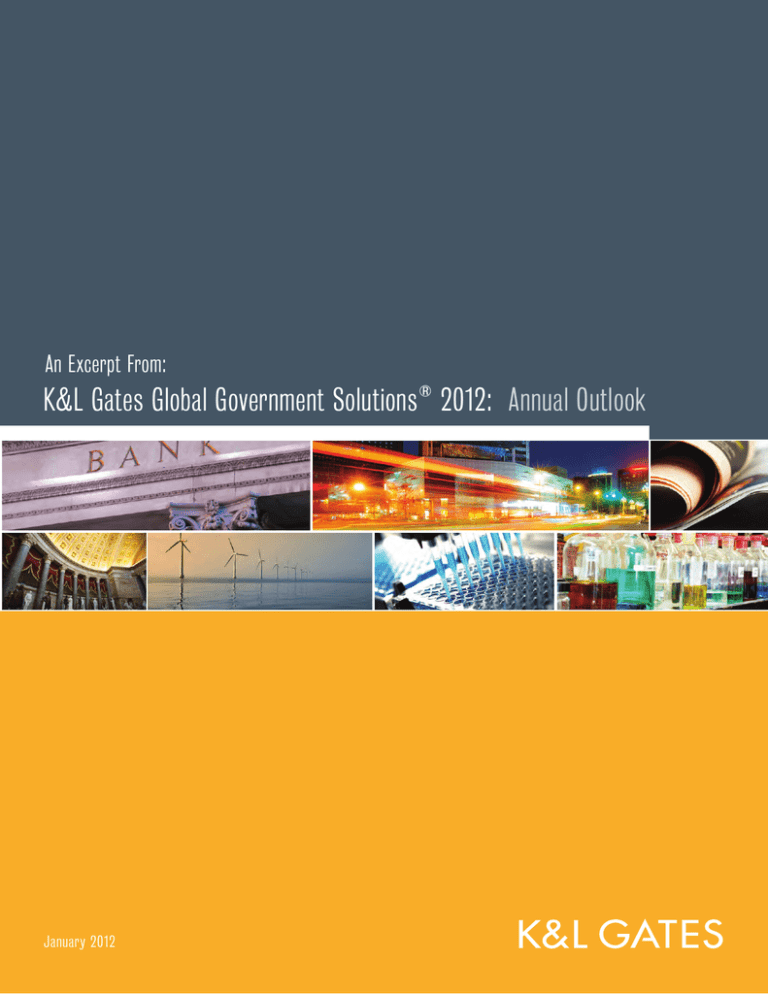
An Excerpt From:
K&L Gates Global Government Solutions ® 2012: Annual Outlook
January 2012
Anti-corruption and Enforcement
Foreign Corrupt Practices Act/Anti-corruption:
What to Expect in 2012
Over the past decade, and particularly in the last five years, law enforcement
actions against international corruption have become commonplace. What is
noteworthy as we enter 2012 is precisely how routine the activity in this area has
become. The U.S. Department of Justice (DOJ) suffered a couple of embarrassing
setbacks in its enforcement efforts, although these are unlikely to have any longterm impact on the program. Efforts to amend and scale back the Foreign Corrupt
Practices Act (FCPA or the Act) have gained support both in Congress and some
sectors of the business community, but even if adopted these will do little to alter the
fundamental features of the enforcement landscape. The fact is that anti-corruption
law enforcement achieved a certain level of stability, and we can expect, for 2012
and beyond, essentially more of the same—a regular flow of cases against both
companies and individuals, primarily but not exclusively by U.S. authorities, many
with penalties in the tens or hundreds of millions of dollars and, at least for an
unlucky few, prison terms of multiple years.
Among the key things to watch for 2012
will be the following:
Vigorous FCPA prosecutions will
continue by both the DOJ and
the Securities and Exchange
Commission.
Both agencies have specialized
units working these cases, staffed
with personnel who continue to gain
experience and industry knowledge,
which they will then bring to bear on
other potential defendants. Even though
fewer FCPA cases were brought in 2011
than in the prior year, this reflects no
slackening of effort or any reduction of
priority for these matters.
Concerned that the anti-corruption
message is still not adequately
appreciated by the private sector,
authorities are emphasizing prosecution
of individuals as well as corporate
entities, and pursuing criminal charges
rather than civil ones where they
believe they can obtain convictions.
This strategy carries risks, as criminal
defendants are more likely to fight these
cases, and some prosecutions failed in
40
2011. The DOJ obtained its first FCPA
criminal conviction of a company in May
2011, only to see it thrown out due
to prosecutorial misconduct, including
the false testimony of a federal law
enforcement agent. The trial of the first
group of “shot show” defendants, who
faced charges arising out of an FBI
“sting” operation, ended with a hung jury
and the declaration of a mistrial, as jurors
apparently struggled with concerns about
entrapment. But these were aberrations
that do not alter the larger enforcement
picture, which continues to reflect a
long record of successful efforts. The
DOJ settled many corporate cases and
won convictions at trial in a significant
number of cases against individuals, with
some defendants sentenced to terms of
more than five years. Other convicted
defendants exhausted their appeals and
prepared to report to prison. The DOJ
also successfully faced down challenges
to its interpretations of key legal
provisions, such as whether employees of
government-owned enterprises should be
considered “government officials” under
the FCPA.
K&L Gates Global Government Solutions ® 2012 Annual Outlook
Authorities reaffirmed their commitment
to aggressive enforcement tactics such
as wiretaps and confidential informants,
and lucrative bounties are now available
to whistleblowers under provisions
of the Dodd-Frank Act. Both the DOJ
and SEC made clear efforts through
their settlements of various cases to
demonstrate the benefits obtained by
those who had self-reported violations
and cooperated with enforcement
authorities, although some observers
remain skeptical, and such benefits
do not lend themselves to precise
quantification.
Efforts at FCPA reform are gaining
some traction, but even if adopted,
these changes will do little to alter
the most central requirements of
the Act.
Key proposals under consideration are
a redefinition of who is a “government
official” to exclude personnel of stateowned enterprises engaged in ordinary
commercial activities, the creation of
an affirmative defense to liability for
companies with effective compliance
programs, and the elimination of criminal
successor liability. As welcome as these
changes would be to the business
community, it is difficult for Washington to
enact any kind of legislation, much less
provisions that could be characterized
as easing up on improper corporate
payments. And, it is unlikely that many
of the FCPA cases being brought would
come out differently under these revised
standards. Perhaps most importantly,
the FCPA enforcement program is a real
money maker for the federal government.
DOJ officials have been completely
candid about the fact that the program
brings in significantly more revenue than
it costs, and that these proceeds help to
Anti-corruption and Enforcement
fund a large portion of the Department’s
criminal enforcement program. They
have been clear about having “no
intention whatsoever” of supporting what
they see as efforts to “weaken the FCPA
and make it a less effective tool for
fighting foreign bribery.”
UK authorities will be keen to find
the right opportunity to bring a
major Bribery Act case.
Britain’s Serious Fraud Office (SFO) may
look with envy on the large settlements
routinely obtained by U.S. authorities,
but for now at least the UK’s budget
woes are likely to force that office to
choose its fights carefully. The SFO’s
head has indicated that the office
will be cautious in selecting the right
enforcement opportunities, and that
the office is not looking for “easy quick
wins.” The SFO is expressly interested in
cases against non-UK companies with a
UK presence who are involved in foreign
bribery, but are in particular seeking
cases in which a UK company can be
said to have lost out to an unscrupulous
competitor. The office disclaims any
intention of wasting its scarce resources
on mere technical violations.
and Switzerland. Nine others engaged
in “moderate” enforcement, while the
remaining 21 countries evaluated had
“little or no” enforcement. The prospects
for improvement on this score remain
uncertain. At the same time, during 2011
there were highly publicized initiatives in
Russia and China to upgrade their laws
against bribery of foreign officials, and
while enforcement of these laws remains
uneven, when enforcement does occur
it may be exceptionally severe. Law
enforcement authorities are increasingly
cooperating and sharing information on
an international basis, and to the extent
non-US authorities become active in
anticorruption enforcement, these issues
will increasingly involve cross-border issues
and pose complex challenges to resolve.
Matt T. Morley (Washington, D.C.)
matt.morley@klgates.com
Brian F. Saulnier (Pittsburgh, Dubai)
brian.saulnier@klgates.com
International anti-corruption
enforcement efforts beyond the U.S.
and the UK remain uneven and
to a large extent non-existent, but
there is steady, albeit very slow,
improvement on this score.
Signatories to the OECD Convention
on Bribery, which include virtually all of
the most developed economies, have
committed to enact legislation much like
the FCPA, criminalizing bribery of foreign
officials in connection with commercial
transactions, and most have had such
laws in place since 2002. According
to Transparency International, however,
only seven of these countries “actively”
enforced these laws: the United States, the
UK, Germany, Italy, Norway, Denmark,
K&L Gates Global Government Solutions ® 2012 Annual Outlook
41
Anchorage Austin Beijing Berlin Boston Brussels Charleston Charlotte Chicago Dallas Doha Dubai Fort Worth Frankfurt Harrisburg
Hong Kong London Los Angeles Miami Moscow Newark New York Orange County Palo Alto Paris Pittsburgh Portland Raleigh
Research Triangle Park San Diego San Francisco São Paulo Seattle Shanghai Singapore Spokane Taipei Tokyo Warsaw Washington, D.C.
K&L Gates includes lawyers practicing out of 40 offices located in North America, Europe, Asia, South America,
and the Middle East, and represents numerous GLOBAL 500, FORTUNE 100, and FTSE 100 corporations, in
addition to growth and middle market companies, entrepreneurs, capital market participants and public sector
entities. For more information about K&L Gates or its locations and registrations, visit www.klgates.com.
This publication is for informational purposes and does not contain or convey legal advice. The information herein should not be used or relied upon in regard to
any particular facts or circumstances without first consulting a lawyer.
©2012 K&L Gates LLP. All Rights Reserved.

